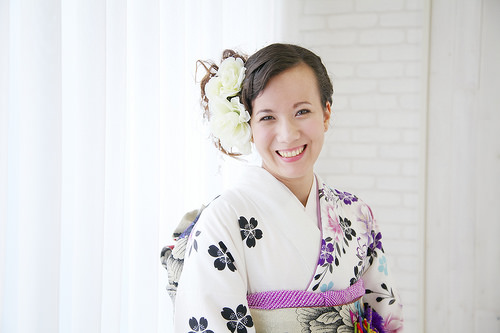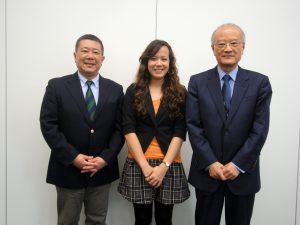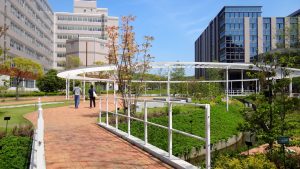Though born in Hattiesburg, Mississippi, Ann Rachel Katagiri was mostly a stranger to the United States until the age of 14.
At 6 months old, she moved to Kanagawa Prefecture, Japan, near Tokyo. She had family in Texas, her mother’s home, whom she visited every two years. But it wouldn’t prepare her for her unexpected move to the South to attend high school after 13 years on the other side of the globe.
“At first, it was very difficult since I could speak English perfectly fine but had never lived in the U.S.,” Katagiri said. “Living in Texas and simply visiting was very different.”
Years later, when a seemingly fated opportunity presented itself at ACU, she would again experience the same major transition by journeying to Fukuoka, Japan, for a year to study at Kyushu Sangyo University.
Katagiri experienced no culture shock this time. She simply had the task of trying to recreate the connection to her home country she once had.
“Going back to Japan, now Fukuoka, was a bit different from Tokyo, but it was still a place comfortable for me,” Katagiri said. “It wasn’t difficult to quickly fall back in love with the country I grew up calling home.”
Her trip was part of a foreign exchange program that, while run through the Study Abroad office, is different from a regular Study Abroad program. Katagiri was the first ACU student to study abroad in the country.
Each semester, ACU accepts two or three students from KSU, but had yet to send one of its own to Japan until Katagiri signed up.
She departed in late March of last year and returned Jan. 6, just before the spring 2015 semester began. While abroad, she completed a list of classes including Chinese Language and Conversation, Japanese Language and Culture and International Business.
She also took Survey in American Culture – a class taught by none other than her own father, Dr. Yasuhiro Katagiri, who has been the professor of American History and Studies in the Department of International Studies of Culture at KSU since April 2013.
“He was and has always been very supportive of me in any endeavor I have attempted, whether it be a little crazy-sounding or not.” Katagiri said. “He is someone whom I respect and look up to the most and whom I am very proud to call my father.”
Getting to live with her father added an element of comfort for Katagiri while she lived so far away from her new home, and it was also an enriching experience for her academically to study with him. She said on top of being an excellent professor, he is fluent in both Japanese and English and has published several award-winning books in English.
“It was wonderful getting to live with him for a year, since I hadn’t lived with him much after graduating high school,” Katagiri said. “I was able to make unforgettable memories which I will cherish for the rest of my life, and I was also able to see first-hand what an awesome teacher he is.”
Though students who do the program through ACU only sign up for one semester which goes from April to the end of August, Katagiri’s love of family and country led to her decision to stay in Japan for an extra semester before returning to Abilene.
Since she had the advantage of growing up in Japan, her transition to a Japanese university was fairly smooth. She already knew the language, but she had never attended school in Japan when she was young. Instead, she was home-schooled in English and attended KUMON, a private after-school program, with her twin sister and older brother.
“It was really cool attending school and seeing the differences between universities. Because if you go to one university you think that’s what all universities are like because that’s how you do it,” Katagiri said. “So it’s so cool seeing even the smallest differences. The people are different, the culture is different, everyone is so nice.”
She said one of the best parts of the college program was the hospitality extended to her by everyone involved while she was in Japan. She also got to meet exchange students from other countries such as Korea, China, Peru and France.
“If you’re a foreign exchange student, they treat you, well not like royalty, but like you’re so important,” she said. “I was able to meet the President, and they hosted this whole welcome ceremony and an ending ceremony at the end of the semester.”
Off-campus, however, she said she had to make some cultural adjustments in order to be polite.
“Some of the big cultural differences are the respectful culture and customs, bowing, customer service, and the subtle way in which people communicate. There is also no tipping in Japan, since it can be insulting, as though it’s an affront on the employee’s salary. People mostly use trains or the subway to commute to work and school or simply walk if close enough. Japan has a lot of people, so it isn’t rare to find yourself squished into a train and feel like a sardine. The food is delicious, something that I miss dearly, even now.”
Katagiri’s year abroad has made her passionate about wanting other students to participate in the program and follow in her footsteps – not only to enrich their college experience, but to raise awareness as well and better represent ACU in future KSU semesters.
“I believe international exchange programs are so vital for a university to have and I think it’s kind of a disappointment that no one has really realized that there is an exchange program with Japan, so when I tell people, they’re like, ‘We have that?'” Katagiri said.
While Japan would probably appeal to more students as a Study Abroad program, Katagiri says she doesn’t see that happening because it would mean ACU would no longer accept Japanese students from KSU for a semester.
“They like having the students come here, they’ve had them coming here for past I don’t know how many years,” she said. “So I don’t really see them changing it, but either way I would love people to take advantage of the program they have.”



